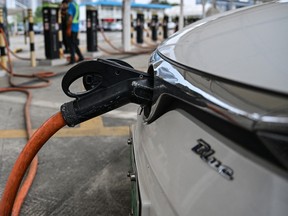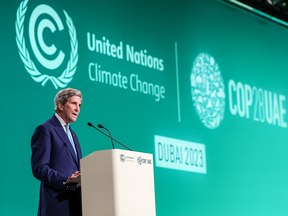The article discusses the slowdown in electric vehicle (EV) sales and its impact on the world’s progress towards net zero emissions. According to BloombergNEF, EV sales are expected to grow at an average rate of 21% annually over the next four years, down from 61% between 2020 and 2023. This slowdown is attributed to several factors, including:
- China’s dominance in PHEV sales: China has become the world’s top market for plug-in hybrid electric vehicles (PHEVs), thanks to affordable models from companies like BYD and Li Auto Inc. However, studies have shown that PHEVs emit more emissions in real-world driving than assumed by tests used for regulatory compliance.
- Industry caution: Several major automakers, including Mercedes-Benz, Volkswagen, Ford, GM, and Jaguar Land Rover, have scaled back their EV investment plans or delayed their targets to go all-electric in some markets by the end of the decade.
- Changing consumer behavior: Consumers are showing a preference for PHEVs over battery-electric vehicles (BEVs), which may be due to concerns about charging infrastructure and range anxiety.
The article highlights that achieving net zero emissions by 2050 will require significant changes in consumer behavior, government policies, and industry investment in EV technology. The Nordic countries, including Norway, are on pace to fully phase out internal combustion engine vehicle sales within the necessary timeframe. However, other regions, including North America and Europe, are falling behind.
Some key statistics mentioned in the article include:
- Global fleet of internal combustion engine vehicles is expected to peak next year.
- Sales would need to end altogether by around 2038 for the world to get to a completely zero-emission fleet by 2050.
- EV sales are expected to grow at an average rate of 21% annually over the next four years, down from 61% between 2020 and 2023.
- PHEV demand is expected to peak in 2030, with sales topping out at almost 9.2 million vehicles.
Overall, the article suggests that the world is falling further off course towards achieving net zero emissions by 2050 due to the slowdown in EV sales and the continued dominance of internal combustion engine vehicles.





